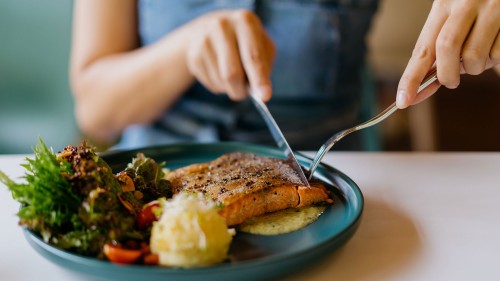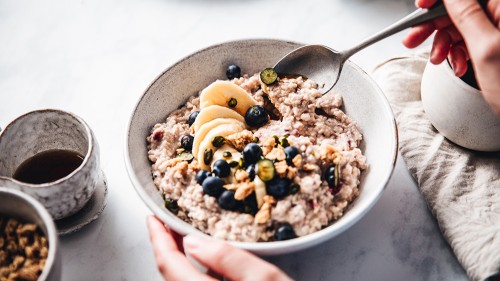WellnessVerge is reader-supported. We may earn a commission when you make a purchase through the links on this page. Learn more about our process here.
Bone Broth Diet Review: Does It Work for Weight Loss?
Last Updated on February 1, 2022
Medically Reviewed by Ana Reisdorf, MS, RD
The Bone Broth Diet combines fasting, eating a Paleo diet, and drinking large amounts of bone broth. It is a very restrictive diet with no clinical studies to date on the exact effects of this eating pattern.


|
Pros
|
Cons
|
How Does It Work?
The Bone Broth Diet is a 21-day plan that involves a combination of the Paleo diet, bone broth, and intermittent fasting.
The main premise of the diet is to utilize the nutritional benefits of collagen.
Collagen, the most abundant protein in the body, is naturally found in bone broth and proponents of the diet believe that collagen carries numerous health benefits.
The Bone Broth Diet is claimed to promote weight loss, enhance gut health, reverse the signs of aging, improve sleep, and reduce joint pain and inflammation.
The diet was developed by Kellyann Petrucci, MS, ND, a naturopathic physician and weight-loss specialist.
She has authored several books, including The Bone Broth Diet, The Bone Broth Cookbook, and The 10-Day Belly Slimdown.
Summary
The Bone Broth Diet is a 21-day diet that utilizes a combination of the Paleo diet, intermittent fasting, and drinking bone broth to gain the nutritional benefits of collagen.
Bone Broth Diet’s Scorecard
The Bone Broth Diet program was objectively evaluated by a dietitian based on the following criteria:
| Evidence-Based | 2/5 |
| Easy to Follow | 1/5 |
| Customization | 1/5 |
| Sustainability | 2/5 |
| Accountability | 1/5 |
| Value for the Price | 4/5 |
| Safety | 4/5 |
| Overall Rating: | 2.1/5 |
What Food Can You Eat?
The 3-week plan includes eating Paleo for five days and fasting for two.
While eating a Paleo diet over the course of the five days, you must also drink anywhere from 1 to 3 cups of bone broth.
During fasting days, you would drink 3 to 6 cups of bone broth.
The Paleo diet consists of:
- Animal protein
- Fruits
- Vegetables
- Nuts and seeds
- Healthy oils, like olive or coconut oil
On the Paleo diet, you cannot eat:
- Grains
- Dairy products
- Sugar and sweetened beverages
- Artificial sweeteners
- Processed foods
- Beans and legumes
While fasting, you can choose to eat one healthy, balanced snack a day within the above guidelines while drinking the bone broth.
Summary
While on the Bone Broth Diet, you can eat a Paleo diet for five days and fast for two.
The Paleo diet is characterized by meats, fruits, vegetables, nuts, and seeds. On fasting days, you will drink 3 to 6 cups of bone broth.
Does the Bone Broth Diet Work for Weight Loss?
Kellyann Petrucci, the founder of this diet, has conducted three unpublished studies reporting that participants “lost up to 15 pounds and up to 4 inches in their measurements.”
The aforementioned studies are limited in many ways.
For example, there is no data on average weight loss, no comparison of the Bone Broth Diet to a standard low-calorie diet, and no long-term evidence on whether participants were able to keep the weight off.
The Bone Broth Diet is calorie-restricted. As with any calorie-restricted diet, the likelihood of short-term weight loss is high.
Additionally, following a low-carbohydrate, high-protein diet like Paleo will also result in short-term weight loss for most people.
A 2020 clinical trial examined the differences between following a low-carb diet versus a low-fat diet. (1)
Researchers found that study participants who followed the low-carb diet lost three times more body fat than those on the low-fat diet.
However, a recent review of the research suggests that even though following the Paleo diet may result in short-term weight loss, the diet is “over-hyped and under-researched.” (2)
Researchers also noted that due to its low-calcium content, the Paleo diet is not safe for those at higher risk of osteoporosis.
Summary
The Paleo diet is a calorie-restricted, low-carbohydrate, and high-protein diet, which may result in short-term weight loss. However, there is no long-term evidence that the Paleo diet promotes sustainable weight loss.
Are There Other Benefits from Following the Bone Broth Diet?
The Bone Broth Diet promises to help with a variety of issues, from skin vitality to gut health. However, none of the claimed benefits have been clearly documented in any research studies.
Reverse the Signs of Aging
One of the claims is that the collagen in the bone broth will help reverse the signs of aging.
The research on collagen supplements is promising for their ability to visibly reduce the signs of skin aging. (3)
However, the collagen found in supplements is broken down to make it more bioavailable (usable for the body).
Unfortunately, the collagen found in bone broth is not broken down, making it unlikely to have the same effects in the body.
Summary
The collagen found in bone broth is not easily absorbed by the body, so its antiaging effects are limited.
Improved Sleep
There is some limited evidence to suggest that collagen may have a calming effect on the body.
Collagen contains a high amount of glycine, an amino acid that your body uses to make proteins that may also help with sleep.
One 2015 study found that glycine helps calm the nervous system and may be a safe, therapeutic option to improve sleep. (4)
More research is needed to establish a stronger link between improved sleep and the glycine found in collagen.
Summary
Collagen contains glycine, an amino acid that may help improve sleep. More research is needed to understand the possible connection between the glycine found in collagen and sleep improvement.
Reduced Joint Pain and Inflammation
Some small studies have shown that taking collagen supplements may help reduce joint pain and inflammation.
For example, one clinical trial showed that taking oral collagen supplements improved exercise-related joint pain. (5)
There is no scientific evidence to suggest that bone broth or this specific Bone Broth Diet can help reduce joint pain and inflammation.
Summary
Collagen supplementation may reduce joint pain and inflammation, but there is no strong evidence suggesting that bone broth or this specific Bone Broth Diet will have the same effect.
Gut Health
Advocates for bone broth claim that it can improve digestion by helping to heal the gut lining.
One study noted that glutamine supplementation might help heal the intestinal barrier in human and animal models. (6)
Still, the authors noted that further research is needed to establish a stronger link.
Summary
Bone broth may help improve gut health, but further clinical research is needed to establish a stronger link.
Sustainability
As noted previously, the Bone Broth Diet is quite restrictive, making it difficult to follow.
Even on non-fasting days, the Paleo diet eliminates many food groups and can be challenging to follow.
The Bone Broth Diet expects dieters to adhere to these guidelines strictly.
If you were to defy the dietary restrictions within the 21-day period, the clock restarts to day 1, and the entire 21 days begins again — yikes. This is very restrictive and not sustainable long-term.
The Bone Broth Diet is not customizable; you have to drink the bone broth to do the diet.
The diet suggests that you can shift to an 80/20 maintenance plan after reaching your weight loss goals.
This means that you should eat Paleo-approved foods 80% of the time. The remaining 20% of the time can be less restrictive, allowing you to eat more freely.
Summary
The Bone Broth Diet is challenging to follow as it involves fasting and, when not fasting, eliminates many foods.
If you defy the diet rules within 21 days, the clock restarts to day one. After 21 days, people can shift to eating a Paleo diet 80% of the time.
Accountability
According to a new study, accountability may be the key to successful, long-term weight loss. (7)
Sharing your data (such as calories you’ve eaten, minutes exercised, and pounds lost) with a dietitian, trainer, coach, or anyone that encourages you can help you sustain higher levels of motivation and keep you on track with your eating and exercise goals.
Unfortunately, besides having the option to purchase Kellyann’s book, the Bone Broth Diet does not include any level of support from a dietitian, coach, or any other trained professional.
However, while having someone other than yourself to hold you accountable is helpful, it doesn’t necessarily have to be a trained professional.
You can share your progress with anyone in your circle, including a friend, family member, or coworker while following the Bone Broth Diet.
Summary
The Bone Broth Diet doesn’t include any level of support to help hold you accountable. However, you can self-monitor your progress and share your information with a friend or family member to help keep you on track.
Cost
You don’t technically need to spend any money to begin following the Bone Broth Diet.
If you would like support in the form of a book, Kellyann Petrucci’s book, The Bone Broth Diet, can be purchased at Amazon for around $16.
The Bone Broth Diet website also contains recipes on making your own bone broth. Additionally, there are many bone broth recipes to sift through online.
If you’re not making your own bone broth at home, you can order it through Kellyanne’s website.
Powdered Bone Broth
“On the go” broth is dehydrated and offers a convenient option to mix with water when you’re away from home.
Each box of powder bone broth includes 7 on-the-go packets priced as:
- 1 box: $28.00
- 2 boxes (1-week supply): $56.00
- 4 boxes (2-week supply): $112
- 6 boxes (3-week supply): $168
You can also save 10% on future orders by signing up for subscribe and save.
Liquid Bone Broth
You can also purchase liquid bone broth through Kellyann’s website for a higher price.
These 3-cup containers of liquid bone broth can be purchased in these packs:
- 6-pack: $129
- 10-pack: $189
- 20-pack: $359
All items purchased from Kellyann’s store can be returned for a full refund within 30 days.
Summary
The Bone Broth Diet doesn’t have any out-of-pocket costs. You have the option to order Kellyann Petrucci’s book, The Bone Broth Diet, and purchase bone broth through her website.
Safety
The 21-day Bone Broth Diet is likely safe to follow for most healthy adults.
However, it is best to talk with your health care professional before beginning any diet to ensure its safety for you.
Pregnant and breastfeeding women should steer clear of the Bone Broth Diet as it is not nutritionally balanced for this population.
Additionally, it’s important to note that during the first two weeks of the diet, you may experience the “keto flu.”
The keto flu is a cluster of symptoms that may appear after following a very low-carbohydrate diet.
Symptoms of the keto flu include:
- headaches
- fatigue
- brain fog
- moodiness
- digestive issues
Summary
The Bone Broth Diet is safe for most healthy adults. However, you may experience the keto flu during the first two weeks of the diet.
How the Bone Broth Diet Compares to Alternatives
For a less restrictive alternative to the Bone Broth Diet, someone could follow a Paleo diet and omit intermittent fasting.
A Paleo eating pattern would allow you to choose whether to include the bone broth in your program.
Additionally, someone could follow a less restrictive intermittent fasting schedule and take a collagen supplement instead of the bone broth as an alternative to the Bone Broth Diet.
For a weight-loss program that is well-balanced and more sustainable than the Bone Broth Diet, one could follow Weight Watchers.
There is a fee to the program ($3.38 to $6.92 per week), but the cost includes accountability, engagement, education, and various tools to help keep you on track.
Unlike the bone broth diet, Weight Watchers offers a balanced way of eating that doesn’t eliminate any foods.
They also provide education and accountability in the form of tracking and coaching.
The Bottom Line
The issue with the Bone Broth Diet, and most short-term diets in general, is their lack of sustainability.
The Bone Broth Diet is very restrictive and would likely be difficult to follow for even 21 days.
Additionally, the Bone Broth Diet lacks any support, whether from a “coach” or a support group, making adherence that much more difficult.
Making bone broth yourself may save you money, but it is a laborious and very time-consuming process.
Meanwhile, fasting takes a significant amount of willpower, making even the most dedicated dieter feel deprived.
Moreover, there is no scientific data or clinical studies showing the exact effects of this diet, making its effectiveness unknown.
Overall, I would probably skip the Bone Broth Diet as it is restrictive with no real benefits you can’t find by simply eating a more balanced diet.
However, if you would still like to purchase the Bone Broth Diet book, you can do so here on Amazon.
Additional Tips
You may be able to reap some of the health claims associated with the Bone Broth Diet by eating a balanced variety of mostly “whole foods” combined with regular exercise.
Following these simple guidelines may help you reach your weight goals and also benefit your overall health:
- Include a variety of brightly colored vegetables in most of your meals and snacks.
- Try including fermented foods such as kombucha, kefir, and tempeh.
- Enjoy lean protein sources such as fish, chicken, or turkey.
- Include more plant proteins in your diet like legumes, nuts, and beans.
- Incorporate plenty of fiber-rich foods like chia and flax seeds.
At WellnessVerge, we only use reputable sources, including peer-reviewed medical journals and well-respected academic institutions.
- Effects of weight loss during a very low carbohydrate diet on specific adipose tissue depots and insulin sensitivity in older adults with obesity: a randomized clinical trial:
https://nutritionandmetabolism.biomedcentral.com/articles/10.1186/s12986-020-00481-9 - Cutting through the Paleo hype: The evidence for the Palaeolithic diet:
https://www.racgp.org.au/afp/2016/januaryfebruary/cutting-through-the-paleo-hype-the-evidence-for-the-palaeolithic-diet/ - Oral Collagen Supplementation: A Systematic Review of Dermatological Applications:
https://pubmed.ncbi.nlm.nih.gov/30681787/ - The Sleep-Promoting and Hypothermic Effects of Glycine are Mediated by NMDA Receptors in the Suprachiasmatic Nucleus:
https://www.ncbi.nlm.nih.gov/pmc/articles/PMC4397399/ - Daily oral supplementation with collagen peptides combined with vitamins and other bioactive compounds improves skin elasticity and has a beneficial effect on joint and general wellbeing:
https://pubmed.ncbi.nlm.nih.gov/30122200/ - Glutamine and the regulation of intestinal permeability: from bench to bedside:
https://pubmed.ncbi.nlm.nih.gov/27749689/ - Counselor Surveillance of Digital Self-Monitoring Data: A Pilot Randomized Controlled Trial:
https://onlinelibrary.wiley.com/doi/10.1002/oby.23015






